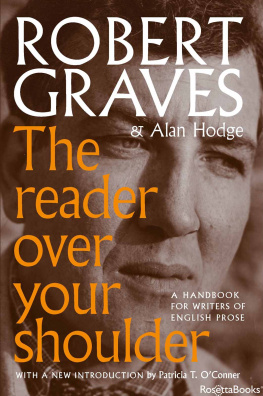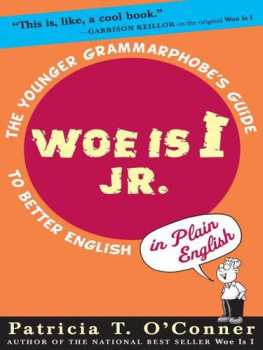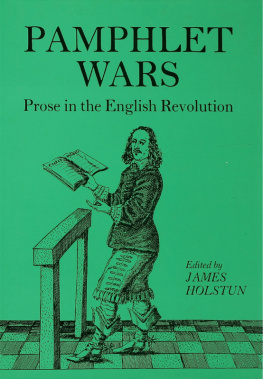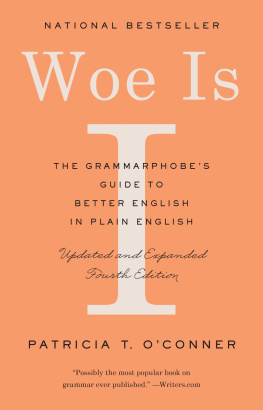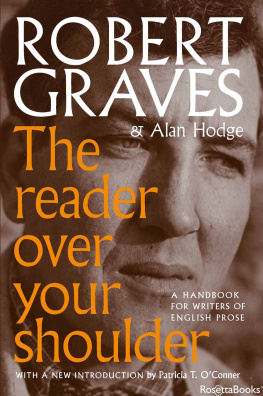Contents
Guide
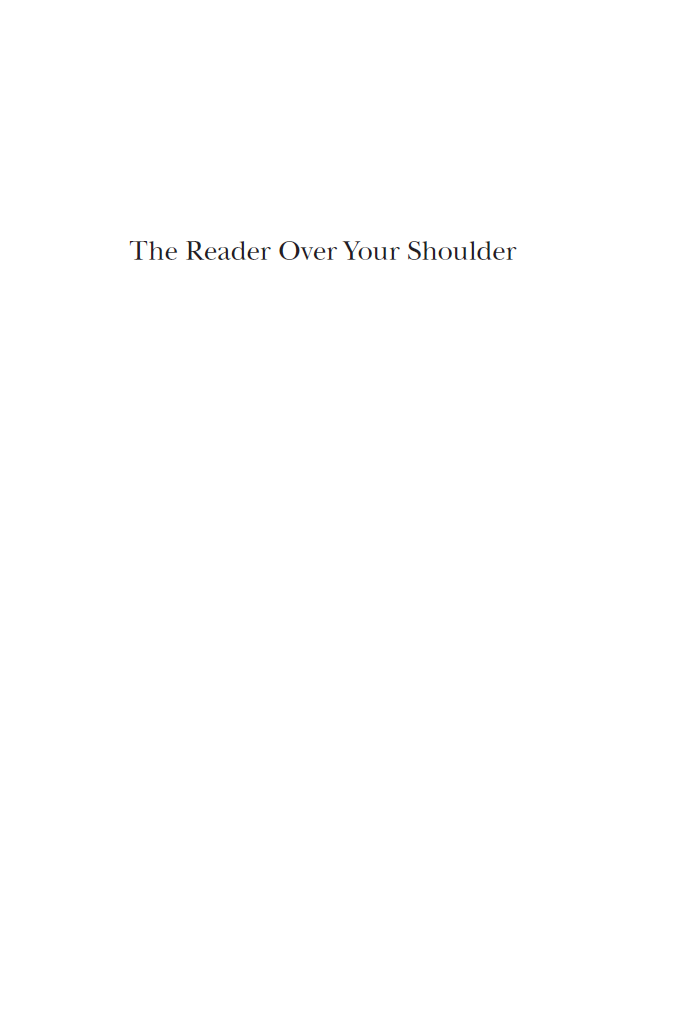

The Reader Over Your Shoulder
Copyright 1943 by Robert Graves and Alan Hodge
Copyright renewed 1971 by Robert Graves and Alan Hodge
Introduction 2017 by Patricia T. OConner
Electronic edition published 2018 by RosettaBooks
All rights reserved. No part of this book may be used or reproduced in any form or by any electronic or mechanical means, including information storage and retrieval systems, without permission in writing from the publisher, except by a reviewer who may quote brief passages in a review.
ISBN (EPUB): 9780795350467
www.RosettaBooks.com

Acknowledgements


We thank all those writers who have allowed us to make critical use of the passages from their books which we quote in Part II; we have asked (and been granted) permission wherever the material used seemed to exceed in length or importance the critics legitimate allowance. The following publishers have asked us to make formal acknowledgements to them: Messrs. George Allen and Unwin on behalf of Mr. Aldous Huxley, Messrs. Ernest Benn on behalf of Mr. J. W. N. Sullivan and Sir Leonard Woolley, Messrs. Blackwell and Mott on behalf of Mr. C. Day Lewis, Cambridge University Press on behalf of Sir Arthur Eddington, Sir James Jeans, Professors Bertrand Russell and A. N. Whitehead, Messrs. Chatto and Windus on behalf of Dr. F. R. Leavis, The National Council for Civil Liberties on behalf of Sir Norman Angell, Messrs. John Murray on behalf of Sir Cyril Norwood, Oxford University Press on behalf of Mr. J. Middleton Murry, Messrs. George Routledge on behalf of Professor I. A. Richards.
Finally we thank our friends Norman Cameron, Patricia Carey, Clifford Dalton, John Dennis, Margaret Frame, John Graves, Francis Hemming, Basil Liddell Hart, Colin McFadyean, Thomas Matthews, James Reeves, Darcy Sullivan, Virginia Wimperis and Gilbert Yates for various assistance in preparing this book.
To Jenny Nicholson

Introduction


This is the best book on writing ever published. Its the sanest, most rigorous examination of English prose style to be found anywhere, and it may also be the most peculiar. I doubt that well see its like again.
An extraordinary book written in extraordinary times, The Reader Over Your Shoulder was begun in the summer of 1940, just after the fall of France and the evacuation of Allied forces at Dunkirk. Europe was now overrun by demagogues. Robert Graves, the celebrated English poet, novelist, and man of letters, had already fled his home in Majorca ahead of Francos troops and returned to England, a country that now feared for its life.
Graves and Alan Hodge, his researcher and collaborator, had just finished writing The Long Week-End , a social history of Britain between the wars. It was an overview of life in the twenties and thirties, and might be summarized as How the British let their hair down in peacetime. The authors now felt that a similar laxity had crept into writing, which even at the highest levels had become loose, confused and ungraceful. With a new war to be won, the kingdom couldnt afford careless, sloppy English. Good communication was critical, but Graves and Hodge were afraid that English prose in its current state was not up to the task: We regard the present crisis as acute enough to excuse this book.
Their proposal, put simply, is that writers should anticipate readers questions, then answer them clearly, logically, and with a minimum of fuss. Some assembly is required, but instructions are included.
Modestly subtitled A Handbook for Writers of English Prose, the book was never merely that. The Reader Over Your Shoulder has been called the authors contribution to the war effort. It would be too much to say that they thought good English could save the world. But to Graves and Hodge, clear and logical prose was not a mere nicety: The writing of good English is a moral matter, as the Romans held that the writing of good Latin was.
The title sums up their theme, stated early in the book: We suggest that whenever anyone sits down to write he should imagine a crowd of his prospective readers (rather than a grammarian in cap and gown) looking over his shoulder. By imagining readers questions, the authors say, the writer will discover certain tests of intelligibility. These tests, outlined in Part I, consist of forty-one principles for writing, twenty-five devoted to clarity and sixteen to grace of expression. Each principle is carefully defined, then illustrated by snippets of writing that fail the test.
In Part II, Graves and Hodge reverse this process. They analyze more than fifty short passages by eminent contemporary writers, applying line by line the principles laid out in Part I. But they dont just point out shortcomings. They actually rewrite the passages. This took a lot of nerve, considering that they were correcting people like T. S. Eliot, Bertrand Russell, Aldous Huxley, Ernest Hemingway, John Maynard Keynes, Cecil Day Lewis, Ezra Pound, Stephen Spender, H. G. Wells, and George Bernard Shaw. (One of their friends suggested as a subtitle A Short Cut to Unpopularity.)
Their purpose was not to sneer at the mighty, but to show that occasionally even the best writers are careless or inattentive. In choosing their samples, the authors explain, they simply took up a book or article by each writer, then read on at our usual speed until we found ourselves bogged in a difficult passage. This passage became the subject of our analysis.
Each samplewhether from a prime minister or a popular novelistis subjected to the same forty-one principles. There should be no doubt in the readers mind as to who, what, when, where, how much, how long, and so on. No word or phrase should be ambiguous or out of place. Sentences should be linked logically and intelligibly. Ideas should follow one another in a natural order. Metaphors should be handled with care. Nothing unnecessary should be included, nothing necessary omitted.
After rewriting each sample Graves and Hodge add a general comment, sometimes excusing a writer because of extenuating circumstances, sometimes adding insult to injury. But the comments are fair (even the acerbic ones) and infuse the book with a personality all its own.
After finding thirty-three faults in a paragraph by Pound, the authors tartly remark, Ezra Pounds writing is wilfully loosenot a natural half-apologetic barbaric yawp like Walt Whitmans, but yawp for yawps sake. The head of Harrow School also gets demerits: Headmasters, like bishops, suffer from an occupational disability: it is very seldom that people venture to criticize their literary style. The headmaster style is usually an uneasy mixture of semi-ecclesiastical oratory, Government Department English, and colloquialisms intended to disarm the natural hostility of schoolboys. And after dissecting an excerpt by Alfred North Whitehead, they conclude: Professor Whitehead is generally acknowledged to be the most thorough, acute and original of contemporary British philosophers. It is strange to find him unbending in this popular work: becoming as conversationally loose as any feather-headed undergraduate.

